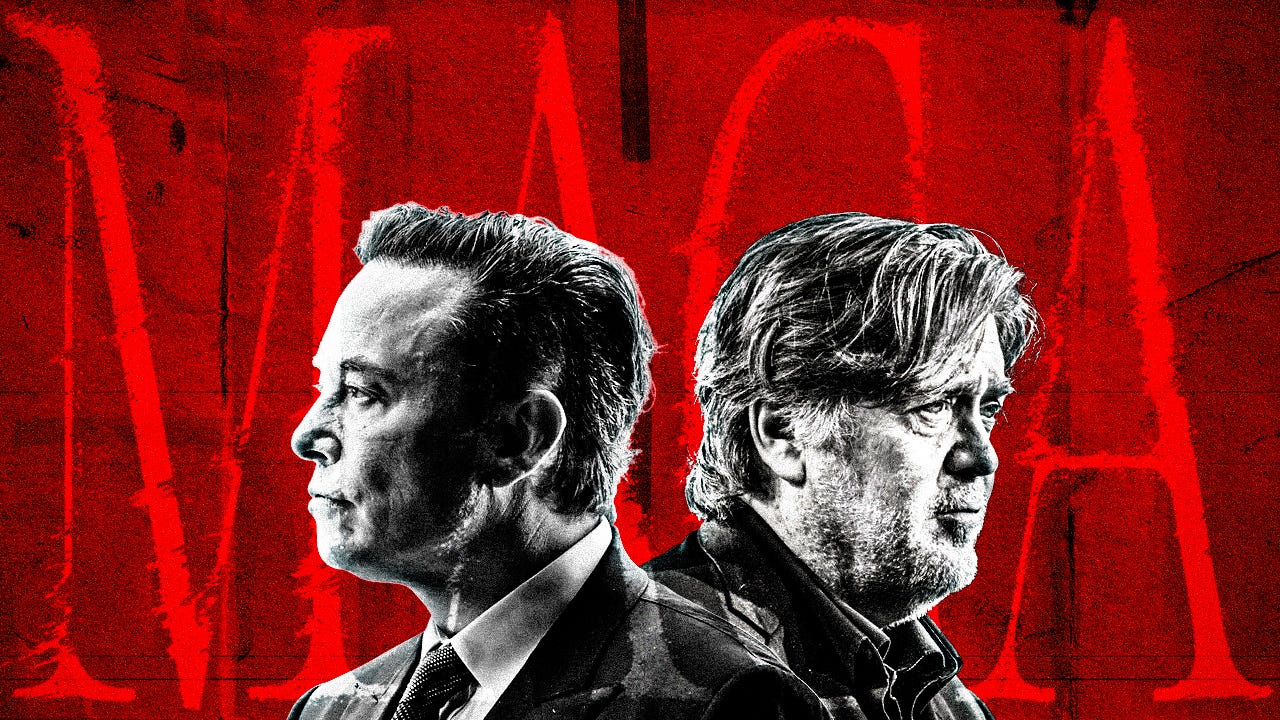Will the Deep Fracture Between Tech Oligarchs and White Working Class Nativists Split MAGA?
Elon Musk and Steve Bannon hate each other’s guts because despite an affinity for social hierarchies they represent diametrically opposed interests
An enduring conceit of the leftist imagination is that the right is a unified monolith. While the left has enjoyed guillotining its own since at least the French Revolution, the idea goes, conservatives, reactionaries, and “counter-revolutionaries” inevitably put their differences aside for the sake of the cause. This isn’t true, of course. The new right is at least as ideologically diverse as the modern left, and many of its varied factions aren’t shy about publicly expressing their contempt for one another. While they may be brought to heel by fear of Donald Trump’s ability to declare anyone persona non grata within the broader MAGA movement, they are also motivated to maneuver against one another for relative power and influence within his orbit.
We saw a quietly spectacular example of this recently in the interregnum spat between Elon Musk and Steve Bannon and their respective followers. For those fortunate enough to need a refresher: Musk is currently acting as a combination of lickspittle and wrecking ball for Trump, and is widely regarded as a leader in the tech-bro wing of the MAGA movement. Appropriately for the billionaire scion of South African emerald mine money, Musk has also helped shore up support from finance oligarchs like Jamie Dimon and Bill Ackman. The other front was led by Steve Bannon: Once considered “Trump’s brain,” Bannon was infamously pushed out of the first MAGA administration before briefly serving prison time awaiting the second. He now heads the Bannon WarRoom podcast, a major source of news and conspiratorial thinking on the far right. Despite lacking the access he once had, Bannon is still widely regarded as a major thought leader on the right and speaks for a vocal wing of the movement.
A House Divided
The spat began when it became clear that the incoming Trump administration would heavily favor the Musk wing of the party over the Bannon wing, with the former expressing an openness to more generous (at least by MAGA standards) immigration policies. Bannon and his allies accused Musk of being an “evil person” and not even a U.S. citizen, and expressed deep hostility towards the idea of maintaining visa programs for highly skilled workers. The Bannon wing quickly spiraled into racist ranting against Indian immigrants, contending that those jobs should go to Americans instead. By contrast, figures like Musk and Vivek Ramaswamy insisted that to maintain its competitive edge America needed to continue attracting the best of the best.
The Bannonites proudly proclaimed that the populist wing of the party would win out in the end, even as it became very clear that more billionaires would get into line alongside Musk than in any other administration in American history. For their part, Musk and his legion of fans fired back over several months, characterizing Bannon as stupid and sparring online with anti-immigrant diehards. Musk even liked a post characterizing the Bannon right as too “retarded” to do high skilled jobs (both factions remain aligned on the use of slurs like the r-word to characterize opponents).
Now there is yet more twists in the never-ending court politics. Bannon has recently softened his tone on Musk, stressing the need to work together. This comes just as Trump’s enthusiasm for Musk in general seems to be softening after the embarrassing defeat of the latter’s electoral strategy in Wisconsin.
Beyond just a clash of big egos, the cattiness reflects a deeper set of ideological divisions that the administration may or may not be able to hold together. For many decades, the conventional wisdom was to follow Ronald Reagan in describing the (mainstream) modern American right as a “three-legged stool” of economic libertarians, socially conservative white evangelicals, and anti-communists/foreign policy hawks. Many elements of this old configuration persist, but they have been joined by a menagerie of smaller factions. These new groups range from neo-reactionaries openly hostile to democracy like Curtis Yarvin, a variety of (often religious) post-liberals, national conservatives who want an open embrace of Christian and/or ethnic nationalism, atheist “Eugenicons” who have traded not reading Locke for not reading Nietzsche, and of course plenty of Trump ride-or-die followers who are happy to go along with whatever happens to pop out of his mouth at any given moment. All this, along with the personalist governing style and impulsive favoritism of Trump himself, has made 2025 court politics something of a brazen spectacle.
Trumpism’s novelty, in the vast historical sweep of era-defining ideologies, means it is still quite possible for any faction within it to effectively shape it in its own image. Of course, any faction that does seek to define it will need to incorporate some of the other groups in temporary alliances and sideline yet others. What can the Musk-Bannon dispute tell us about how this might happen?
Tech Bros and Ethno-Nationalists
Musk and Bannon, the two factional figureheads who attempted to draw lines in the sand about what the precise MAGA position on immigration will be, certainly have overlapping ideological affinities. But each also represents a core constituency on the Trumpian right.
On the one hand is the burgeoning tech-bro wing of the American right, which tends to combine right-libertarian economic attitudes with an authoritarian politics rooted in powdery elitism (pun intended). This disposition has roots in the American right going back to the height of social Darwinism and running through Ayn Rand’s division of the world into productive builders and parasitic takers. Its version of libertarianism is more a kind of aristocratic hyper-individualism, where America is mythologized as the land where the best of the best can rise to the top through their own unaided efforts—a few million-dollar loans from dad notwithstanding. The authoritarianism comes, as Peter Thiel once put it, from ressentiment over how democracy enables the many to place limits on those who see themselves as the gilded few. At its most extreme, figures like Yarvin openly contemplate running America like a business by just appointing someone, like a CEO in chief, to wield king-like power. But while the tech-bro wing is very willing to listen to self-flattering myths about heroic investors, it historically has less patience for crude nationalist appeals to put Americans first, at least when doing so will cut into profits by limiting their ability to pool talent from across the globe and do business where needed.
By contrast, Bannon’s wing of the party takes its authoritarianism in an explicitly populist and ethno-nationalist direction, comfortable with blatant racism. For the ethno-nationalists, America First means putting Americans first—though who is allowed to count as American is debated and ever-changing. This attitude, unfortunately, is not a rarity in U.S. history: from the Dred Scott decision declaring only white Americans as fit to be citizens to transparently racist immigration laws like the Chinese Exclusion Act, the original Nazi-friendly America First movement, George Wallace’s fierce defense of segregation, Bannon and his ilk are drawing from a well they did not themselves construct.
In its current iteration, some of the more erudite ethno-nationalists will parrot far-right darlings like Nazi legal theorist Carl Schmitt, Sam Francis, and Pat Buchanan. The base of the movement is largely motivated by parallel—but contrasting—feelings of elitism to those of the tech-bro right. For the ethno-nationalist right, being a “real” American is itself supposed to be a sign of status and privilege. They deeply resent the quasi-individualist approach of the tech-bro right, who they perceive as taking a condescending attitude towards them. They’re not wrong to detect this; in a Dec. 2024 Substack post, Richard Hanania—himself something of a convert from the ethno-nationalist right to a classical liberal, at least according to him—defended the tech-bro right and sneered at the “populist right’s Nietzschean aesthetics and the reality of the movement, which appeals to the dumbest people and encourages them to indulge in a victimhood mentality.”
MAGA’s Common Core
It is by no means impossible or even improbable that these two cadet branches of the House of MAGA might be wed together again. As John Ganz has noted, for all their differences, there are many things that unite these two wings of the right; there is a deep symmetry in their worldviews. Tech bros see the world in hyper-competitive terms, with deeply self-interested individuals trying to make it to the top—with democracy and its institutions seen as an impediment to the realization of their rise. Nationalist populists often see things the same way, except in national, ethnic, and racial terms instead of individual ones.
Another major point of reconciliation: the tech-bro and populist right will both ascribe immutable forms of inferiority onto those they deem unworthy, to justify their subjugation. This is one of the reasons race- and IQ-based pseudo-science, along with abundant attempts to justify the subordination of women, are popular across both of these MAGA wings. It provides a handy and self-flattering explanation for why some people should be privileged over others, even if the question of who, precisely, winds up atop the pecking order may be disputed.
It's not surprising that these two wings have overlapping affinities. These are, after all, subcultures grounded in the fundamentals of far-right ideology. As Janet Bufton and Tom G. Palmer explained in their comprehensive two-part resource on this movement:
Far-right figures envision societies organized through hierarchies—whether racial, ethnic, religious, or ideological. ... The far right believes that liberal pluralism represents a dangerous and unprecedented upheaval of the natural order. The far right blames most or all social problems on that upheaval—that is, on liberalism. ... The far right also believes that “race science”—sometimes more palatably labeled “human biodiversity studies”—explains and justifies hierarchies. ... Moreover, the far right believes that gender and social roles are straightforward, set, and determined by either religion or the biological needs of a race, and that when rightly ordered and enforced, they perfect the overall imagined “natural” order.
There should be no doubt about the ugliness of both these MAGA strands. Many on the right are fond of referring to classical history; they would thus do well to read Thucydides’ account of how those who pompously proclaimed “the strong do what they can and the weak suffer what they must” brought their country and themselves to shame, disaster, and ruin.
© The UnPopulist, 2025
Follow us on Bluesky, Threads, YouTube, TikTok, Facebook, Instagram, and X.
We welcome your reactions and replies. Please adhere to our comments policy.









Re: "the land where the best of the best can rise to the top through their own unaided efforts": I saw what was packaged as a proposal for replacing our higher education system with something modeled after a project of seeking out creative geniuses with a rare combination of character traits and a well-formed entrepreneurial plan, then offering them funding and occasional coaching. Hardly anything was said about instruction, and nothing was said about how this model would translate to a larger set of people who aren't creative geniuses with very special traits.
The takeaway: the best of the best deserve assistance in rising to the top, while everyone else isn't worthy of any concern. The project in question is aligned with Peter Thiel.
Others in the reactionary right like to invoke the "natural order" as something that aligns (often explicitly) with their religious beliefs, while they sneer at "liberalism" as an "ideology" that was imposed upon the world, and indeed a force that has become "totalitarian." Which all sounds somewhat upside down.
Bannon clearly seems the problem and should be taken as a serious threat that needs to be investigated and undermined while it’s still relatively easy to do.
https://open.substack.com/pub/joeyortega/p/stephen-k-bannon-russian-influenced?r=2scq8